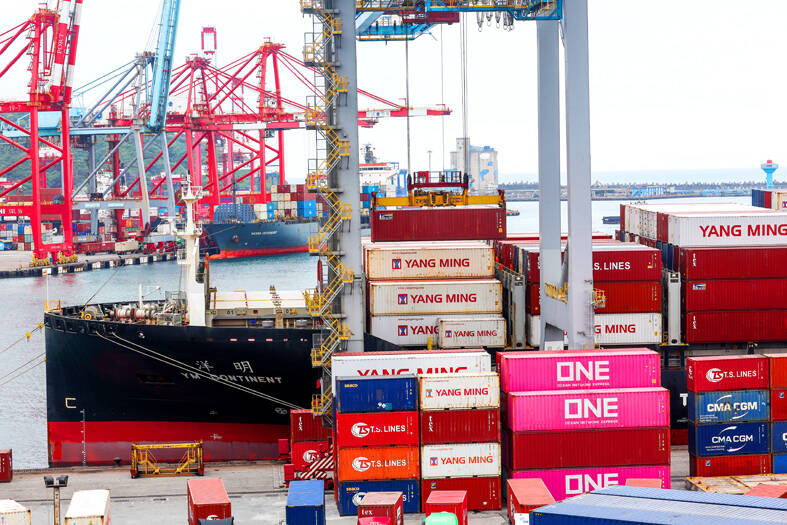The government’s business climate monitor last month flashed “green” for the second straight month, as the nation’s export-focused economy steadily gained traction thanks to improving outbound shipments and industrial production, the National Development Council (NDC) said yesterday.
The total score of the composite index of monitoring indicators' nine constituents gained two points to 29 from the previous month, indicating a continued state of recovery, NDC research director Wu Ming-huei (吳明蕙) said.
“Fast-growing global AI [artificial intelligence] demand is benefiting local firms on the supply chain, catapulting the gauges on exports, industrial output and overtime hours to booming territory,” Wu told a news conference in Taipei.

Photo: CNA
The recovery would grow more evident going forward, as inventory adjustments for technology products would come to an end soon, NDC Minister Kung Ming-hsin (龔明鑫) told a meeting of the legislature’s Economics Committee earlier this week.
The council uses a five-color system to capture the nation’s economic state, with “green” indicating steady growth, “red” suggesting a boom and “blue” reflecting a recession. Dual colors suggest a transition to a stronger or weaker state.
The index of leading indicators, which aims to forecast economic conditions in six months, increased 0.60 percent month-on-month to 101.68 last month, as readings on the labor accession rates, export orders, construction floor space, share prices and business confidence displayed positive movements, the council said.
The improvements came even though imports of semiconductor equipment and money supply remained soft, it said.
Semiconductor equipment is important because it sheds light on the capital spending of major local technology firms, as Taiwan is home to the world’s largest supplier of advanced chips.
The index of coincident indicators, which reflects the current economic situation, increased 0.32 percent to 100.40, aided by advances in industrial production and manufacturing sales, as well as wholesale, retail and restaurant revenue, the council said.
By contrast, the reading on electricity usage and export volume declined due to fewer working days, it said.
In related developments, the consumer confidence index this month inched up 0.29 points to 73.51, as people feel more optimistic about stock investment, economic growth and household income, a survey by National Central University showed yesterday.
The sentiment on stock investment rose 1.56 points, as the TAIEX remained above 20,000 points despite capital outflows.
The rising popularity of domestic and foreign exchange-traded funds lent support to the local bourse, said Dachrahn Wu (吳大任), director of the university’s Research Center for Taiwan Economic Development, which conducted the survey.
Capital flows to exchange-traded funds are not a bad thing, as they are common investment tools around the world and most target diversified blue-chip stocks, making them relatively stable compared with other investment vehicles, Wu said.

MULTIFACETED: A task force has analyzed possible scenarios and created responses to assist domestic industries in dealing with US tariffs, the economics minister said The Executive Yuan is tomorrow to announce countermeasures to US President Donald Trump’s planned reciprocal tariffs, although the details of the plan would not be made public until Monday next week, Minister of Economic Affairs J.W. Kuo (郭智輝) said yesterday. The Cabinet established an economic and trade task force in November last year to deal with US trade and tariff related issues, Kuo told reporters outside the legislature in Taipei. The task force has been analyzing and evaluating all kinds of scenarios to identify suitable responses and determine how best to assist domestic industries in managing the effects of Trump’s tariffs, he

TIGHT-LIPPED: UMC said it had no merger plans at the moment, after Nikkei Asia reported that the firm and GlobalFoundries were considering restarting merger talks United Microelectronics Corp (UMC, 聯電), the world’s No. 4 contract chipmaker, yesterday launched a new US$5 billion 12-inch chip factory in Singapore as part of its latest effort to diversify its manufacturing footprint amid growing geopolitical risks. The new factory, adjacent to UMC’s existing Singapore fab in the Pasir Res Wafer Fab Park, is scheduled to enter volume production next year, utilizing mature 22-nanometer and 28-nanometer process technologies, UMC said in a statement. The company plans to invest US$5 billion during the first phase of the new fab, which would have an installed capacity of 30,000 12-inch wafers per month, it said. The

Taiwan’s official purchasing managers’ index (PMI) last month rose 0.2 percentage points to 54.2, in a second consecutive month of expansion, thanks to front-loading demand intended to avoid potential US tariff hikes, the Chung-Hua Institution for Economic Research (CIER, 中華經濟研究院) said yesterday. While short-term demand appeared robust, uncertainties rose due to US President Donald Trump’s unpredictable trade policy, CIER president Lien Hsien-ming (連賢明) told a news conference in Taipei. Taiwan’s economy this year would be characterized by high-level fluctuations and the volatility would be wilder than most expect, Lien said Demand for electronics, particularly semiconductors, continues to benefit from US technology giants’ effort

‘SWASTICAR’: Tesla CEO Elon Musk’s close association with Donald Trump has prompted opponents to brand him a ‘Nazi’ and resulted in a dramatic drop in sales Demonstrators descended on Tesla Inc dealerships across the US, and in Europe and Canada on Saturday to protest company chief Elon Musk, who has amassed extraordinary power as a top adviser to US President Donald Trump. Waving signs with messages such as “Musk is stealing our money” and “Reclaim our country,” the protests largely took place peacefully following fiery episodes of vandalism on Tesla vehicles, dealerships and other facilities in recent weeks that US officials have denounced as terrorism. Hundreds rallied on Saturday outside the Tesla dealership in Manhattan. Some blasted Musk, the world’s richest man, while others demanded the shuttering of his